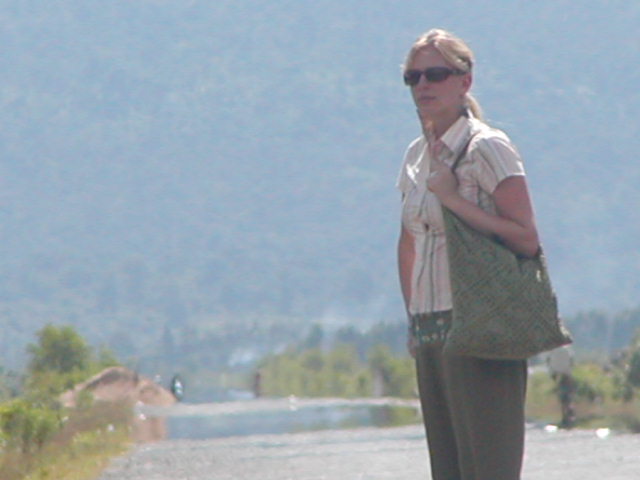A sudden blackness falls over the city and phenomenal crashing causes us to scream and run to the window. Incredible rows of fork lightning cut through the black sky in pinks, organges and purples forcing everyone to and stop in awe at the earth’s magnificence. I look down from my balcony and hear screeches of joy and laughter as naked children skip through vast puddles and open their face to the golf ball sized drops splashing over their little bodies. We welcome the monsoon with cravings for cool air, taming of the dust, and to feel the new energy of life as the bright green rice fields come into bloom.

This gift of the earth’s ability to replenish itself after a long harsh season of 40 degree day and night heat, has been hampered by the troubles of man. For many the build up to this season was filled with anxiety and fear. One year ago the people of Sombok Chap were faced by their worst nightmare as the military armed with AK47’s forcibly evicted them from their homes in the centre of Phnom Penh. They were ushered at gunpoint to an undeveloped rice field some 20K outside of the city and given a bucket and a tarpaulin. 1000 families sat month after month waiting in limbo on the promise of small plots of land and a chance to re-build their lives. With no means of earning an income, these families quickly fell into unimaginable depths of despair as malnutrition swelled the children’s bellies, skin diseases covered their bodies, typhoid engulfed the community, and hope evaporated in the oppressive heat.

We sat in the lavish Foreign Correspondence Club, a magnificent old colonial mansion nestled between the great Tonle Sap River and the golden turrets of the Royal Palace, where French diplomats and intelligencer once philosophised over cups of strong black coffee. 40 or so members of Phnom Penh’s international community sat in rows sipping red wine and cappuccinos as two women stood with outstanding courage and told of their stories at the relocation site. They stood clutching their shoeless children, unable to suppress a public show of emotion, normally unthinkable in Khmer culture. They told of their husbands who never came home because their work on the construction sites did not pay enough to afford the journey back to the remote rice paddy. They told of their children living in squalor with no access to education or even nutritional food. T
 hey looked to the ceiling and back into our eyes, placed their hands in a prayer position and begged us to help them get out of the field before the rains came. But now it’s already too late, many of then live in a lake as the rain pours through the hole in their canvas roof and the ground of their shack is muddy sludge.
hey looked to the ceiling and back into our eyes, placed their hands in a prayer position and begged us to help them get out of the field before the rains came. But now it’s already too late, many of then live in a lake as the rain pours through the hole in their canvas roof and the ground of their shack is muddy sludge. On June 6th this international community stood hand in hand with local community representatives at a vigil to mark the one year anniversary of the eviction at Sombok Chap. We stood in silence holding candles as Buddhist monks blessed the ceremony. The message was clear: those families living in destitute will not be forgotten, and we plead that the government reforms it’s barbaric, inhumane eviction policies so that this does not happen again.
On June 6th this international community stood hand in hand with local community representatives at a vigil to mark the one year anniversary of the eviction at Sombok Chap. We stood in silence holding candles as Buddhist monks blessed the ceremony. The message was clear: those families living in destitute will not be forgotten, and we plead that the government reforms it’s barbaric, inhumane eviction policies so that this does not happen again.But nobody listened, and just weeks ago, the seaside town of Sihanoukville experienced one of the most violent evictions to date. As the military rolled in, they fired their guns in the air and on the ground. They looted the houses, stole motorbikes, and then deluged the wooden houses in petrol and torched them as their inhabitants stood in disbelief staring as their life went up in flames. Residents trying to trying to protect themselves and resist these acts of insanity were beaten, arrested and now face p
 rison sentences.
rison sentences.My organisation Bridges Across Borders (www.babsea.org) went this weekend to deliver 2 tons of rice, tarpaulins, mosquito nets (essential as Cambodia now faces an epidemic of Dengue fever, worsened by breeding of mosquitoes in the rainy season) to this community that now live on the side of the main road near to where their village once was.

As the rain pours down, it serves as a reminder to all of us sitting in Foreign Correspondence Clubs, or squishy sofas in air conditioned houses, of those who don’t have access to one of the most basic human rights: a home. The world was encouraged to stop and think about all those relocated and left destitute by war, famine and natural disaster on International Refugee Day.
 I ask you to think today that as for every drop of rain that falls, so does a tear for those who are left squatting by the side of the road, wondering what they ever did to deserve this fate.
I ask you to think today that as for every drop of rain that falls, so does a tear for those who are left squatting by the side of the road, wondering what they ever did to deserve this fate. 